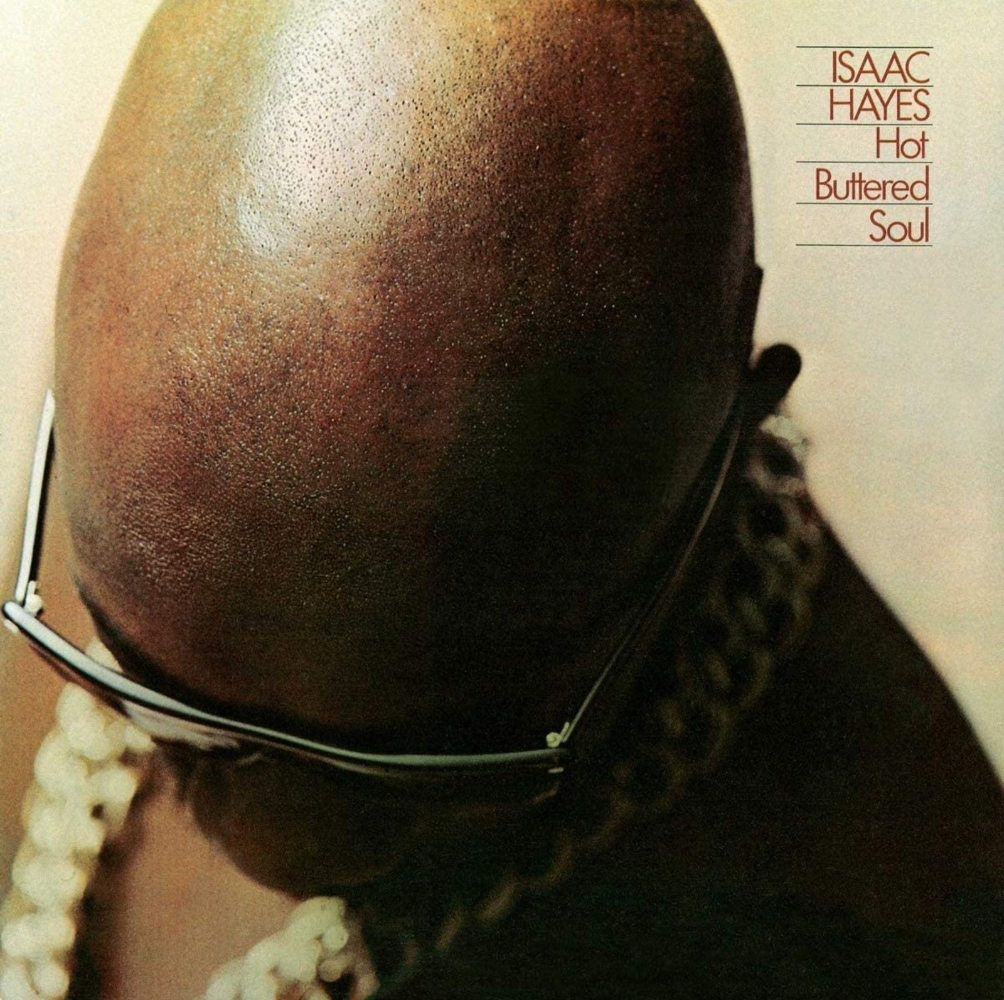
Symphonic soul. That's what the stylings of Hot Buttered Soul became know as. It was called this because wasn’t anything like what "regular" soul music sounded like and nobody knew what to make of it. So they gave it a name. It wasn't the type of music considered to be radio-friendly, which at that time was focused on catchy, three-minute hits. But … there was something completely new about the sound of this record. Lush arrangements featuring strings and horns were applied to songs we knew but, as it turns out, we didn't really know. The 12-minute interpretation of the Burt Bacharach-Hal David classic, Walk On By, starts everything off and it's two full minutes before Hayes' voice makes an appearance. And when it does - wow! The intro leading up to the voice is one of the greatest - if not the greatest - R&B guitar intros of all time. Overlaid atop the cheesy 1970s string arrangement and the siren-call of the background singers - it's just so wonderful! I never get tired of playing it.
Then there's the almost 19-minute (!!) version of Jimmy Webbs's By The Time I Get To Phoenix - best remembered as the Glen Campbell hit, itself a classic - that takes up all of side two and is served up with a spoken word nine-minute morality tale introduction! Listened to it as a whole, this record is as much astonishing as it is confusing. Comprised of only four tracks - three of them interpretations (not covers) of other artists' songs - Hot Buttered Soul ripped up the R&B/soul rule book. Walk On By pulls you in, and Phoenix finishes you off. What would probably have been career suicide in any other hands is instead here turned into a soul masterpiece that changed the course of the R&B river and opened up so many new tributaries of inspiration and ways of thinking. Sly and the Family Stone would pick up the torch and run with it the following April with their 13-minute Sex Machine jam, but this is where it all started. There's so much here but nothing is done to excess, and you can literally feel the summer heat just by looking at the cover.
Released in September, 1969 - 53 freakin' years ago! - this is beyond any doubt where psychedelia first met soul. This record got a reissue on Craft Recordings in 2018 featuring 180-gram vinyl, remastering from the original analogue tapes and beautiful packaging. That's the version I am listening to and it sounds incredible. I also have an original pressing. To my ears they sound different, although it's hard to put my finger on it other than to say it's most likely a result of the remastering process. Both sound very good. Depending on the day and the mood, one or the other sounds better. Sort of.
Hayes had been a part of the music industry for years before he embarked on his own solo career. In the early '60s he worked as a session player and staff producer at Stax and played on many of the records made there, including songs by Otis Redding, Booker T and the MGs and Sam and Dave. He also helped write several soul classics with his writing partner, David Porter, including Soul Man, When Something’s Wrong with My Baby, I Thank You, and Hold On, I’m Comin’.
Hot Buttered Soul only includes one original song, Hyperbolicsyllabicsesquedalymistic, which wouldn't have fit comfortably on the label a 45. But Hayes didn't care about hit records. He wanted to remain true to his art and didn't give any consideration to commercial success, which allowed him to completely deconstruct the songs he covered by using the skeletons of their melodies simply as foundations over which he laid psychedelic guitar distortions and lush orchestrations.
Symphonic soul, indeed.
Two more albums followed in 1970. The first, The Isaac Hayes Movement, features an 11-minute interpretation of The Beatles’ Something that features a strung-out fusion violin solo and is such an extraordinary reimagining it must have impressed George Harrison greatly. The second, … To Be Continued, contains a long, psychedelic guitar workout on The Look of Love, another Bacharach-David collaboration originally sung by Dusty Springfield. Two double albums followed those records - Shaft and Black Moses - and Hayes would become known as a bonafide soul visionary. But Hot Buttered Soul is what started everything, and while it is definitely a product of the time in which it was recorded it stands up mightily. This record directly influenced Hayes' peers and successors: Curtis Mayfield’s Curtis, the self-titled debuts of Parliament and Funkadelic and - perhaps most notably - Marvin Gaye’s What’s Goin’ On. None of them would have been possible without this recording busting through first.
Many LPs have been called groundbreaking, but in a lot of instances it's hyperbole and exaggeration. That's not the case here. This is a recording that deserves to be in every record collection. This reissue will undoubtedly bring a new generation of fans to Hayes' music, many of whom probably only know him as the voice of Chef on South Park. They will be surprised at how much deeper his legacy reaches.
This record is …
Symphonic soul. That's what the stylings of Hot Buttered Soul became know as. It was called this because wasn’t anything like what "regular" soul music sounded like and nobody knew what to make of it. So they gave it a name. It wasn't the type of music considered to be radio-friendly, which at that time was focused on catchy, three-minute hits. But … there was something completely new about the sound of this record. Lush arrangements featuring strings and horns were applied to songs we knew but, as it turns out, we didn't really know. The 12-minute interpretation of the Burt Bacharach-Hal David classic, Walk On By, starts everything off and it's two full minutes before Hayes' voice makes an appearance. And when it does - wow! The intro leading up to the voice is one of the greatest - if not the greatest - R&B guitar intros of all time. Overlaid atop the cheesy 1970s string arrangement and the siren-call of the background singers - it's just so wonderful! I never get tired of playing it.
Then there's the almost 19-minute (!!) version of Jimmy Webbs's By The Time I Get To Phoenix - best remembered as the Glen Campbell hit, itself a classic - that takes up all of side two and is served up with a spoken word nine-minute morality tale introduction! Listened to it as a whole, this record is as much astonishing as it is confusing. Comprised of only four tracks - three of them interpretations (not covers) of other artists' songs - Hot Buttered Soul ripped up the R&B/soul rule book. Walk On By pulls you in, and Phoenix finishes you off. What would probably have been career suicide in any other hands is instead here turned into a soul masterpiece that changed the course of the R&B river and opened up so many new tributaries of inspiration and ways of thinking. Sly and the Family Stone would pick up the torch and run with it the following April with their 13-minute Sex Machine jam, but this is where it all started. There's so much here but nothing is done to excess, and you can literally feel the summer heat just by looking at the cover.
Released in September, 1969 - 53 freakin' years ago! - this is beyond any doubt where psychedelia first met soul. This record got a reissue on Craft Recordings in 2018 featuring 180-gram vinyl, remastering from the original analogue tapes and beautiful packaging. That's the version I am listening to and it sounds incredible. I also have an original pressing. To my ears they sound different, although it's hard to put my finger on it other than to say it's most likely a result of the remastering process. Both sound very good. Depending on the day and the mood, one or the other sounds better. Sort of.
Hayes had been a part of the music industry for years before he embarked on his own solo career. In the early '60s he worked as a session player and staff producer at Stax and played on many of the records made there, including songs by Otis Redding, Booker T and the MGs and Sam and Dave. He also helped write several soul classics with his writing partner, David Porter, including Soul Man, When Something’s Wrong with My Baby, I Thank You, and Hold On, I’m Comin’.
Hot Buttered Soul only includes one original song, Hyperbolicsyllabicsesquedalymistic, which wouldn't have fit comfortably on the label a 45. But Hayes didn't care about hit records. He wanted to remain true to his art and didn't give any consideration to commercial success, which allowed him to completely deconstruct the songs he covered by using the skeletons of their melodies simply as foundations over which he laid psychedelic guitar distortions and lush orchestrations.
Symphonic soul, indeed.
Two more albums followed in 1970. The first, The Isaac Hayes Movement, features an 11-minute interpretation of The Beatles’ Something that features a strung-out fusion violin solo and is such an extraordinary reimagining it must have impressed George Harrison greatly. The second, … To Be Continued, contains a long, psychedelic guitar workout on The Look of Love, another Bacharach-David collaboration originally sung by Dusty Springfield. Two double albums followed those records - Shaft and Black Moses - and Hayes would become known as a bonafide soul visionary. But Hot Buttered Soul is what started everything, and while it is definitely a product of the time in which it was recorded it stands up mightily. This record directly influenced Hayes' peers and successors: Curtis Mayfield’s Curtis, the self-titled debuts of Parliament and Funkadelic and - perhaps most notably - Marvin Gaye’s What’s Goin’ On. None of them would have been possible without this recording busting through first.
Many LPs have been called groundbreaking, but in a lot of instances it's hyperbole and exaggeration. That's not the case here. This is a recording that deserves to be in every record collection. This reissue will undoubtedly bring a new generation of fans to Hayes' music, many of whom probably only know him as the voice of Chef on South Park. They will be surprised at how much deeper his legacy reaches.
This record is …



